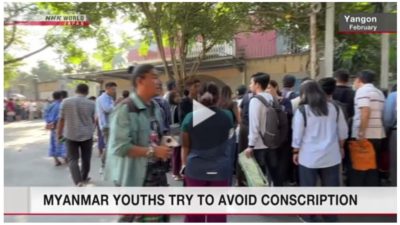ニュースで学ぶ現代英語 24/4/1(月) -ミャンマー 徴兵避け若者の出国相次ぐ
ブログ記事の抜粋
ニュースで学ぶ現代英語 24/4/1(月) -「現代英語」の世界へようこそ!-ミャンマー 徴兵避け若者の出国相次ぐ
Christy クリスティさんのトークもあります。
(Welcome to the world of “Modern English”!
“Learning ‘Modern English’ through the News” is now in its third year. In the second half of the week, we will welcome experts from various fields as instructors to support your English learning from a new perspective.
I recommend this program to everyone who has completed the basics of English. It’s a lifelong learning experience, so anyone can take advantage of it. The learning material is authentic English from news programs (NHK’s international broadcasts), which is representative of modern English, but will be explained in a way that can be understood by high school students and above.)
(Since it’s April, the new academic year, I would like to explain about “Modern English” in the program title.
Think of “Modern English” as “English as it is actually used in the modern world.” This program is a comprehensive course that will help you better understand “English as it is actually used in the modern world” and help you communicate in English.
English has evolved rapidly throughout history. It is no longer limited to British English or American English, but is now widely used as a common language around the world. I think people are starting to think of English as “our language,” rather than a “foreign language.”
The idea of “World Englishes” is also emerging. The reason why English-es is plural is because there is a nuance that English is no longer just one language, but has variations.)
Christy:
Yes, even people from America, like me might have trouble understanding another type of English. The pronunciations and phrases might be completely different.
(確かに、私と同じようなアメリカ人でも、別の種類の英語を理解するのは難しいかもしれません。 発音やフレーズが全く異なる場合があります。)
For example, in the news we picked up this time, the newscaster pronounces junta, which means “military government,” in British English like “junta,” but in American English, it is often pronounced “junta.” Furthermore, some people pronounce it as “Hanta” or “Junta”. We will explain this on the program so that you will not be confused when you come across these variations of English.)
(English is constantly changing. There are an increasing number of expressions that cannot be understood using only the vocabulary and grammar learned at school.There are an increasing number of expressions that cannot be understood using only the vocabulary and grammar learned at school.)
Christy:
That’s true. The English we use is constantly changing and evolving. Even for us, native speakers, we are always learning something new.
(それは当然です。 私たちが使用する英語は常に変化し、進化しています。 私たちネイティブスピーカーにとっても、常に何か新しいことを学んでいます。)
–
(English is constantly changing. There are an increasing number of expressions that cannot be understood using only the vocabulary and grammar learned at school. The “real English” that is actually used around the world, including on the news and the Internet, is an applied problem. There are many expressions that are difficult to understand. In such cases, we will explain each one in this program.
In particular, reflecting the globalization of the world, the English vocabulary has become very diverse and is closely related to global movements. News English is a representative example of modern English.
Let’s learn “English as an international language” without focusing on British English or American English. The aim of the program is for students to learn “Modern English,” a rich language that has come to have a wide international and cultural perspective, and to be able to discuss various topics with people from all over the world.
In this course, instead of reading the paper text, you can view the full text translation and detailed explanations on the website. Please use all means.)
クリスティさん、今回初めてでしたがどうでしたか?
Christy:
To be honest, I was a little nervous at first. But I had a great time. I can’t wait for the next one.
Keep up the good work.
See you next time.

